Important News
Before we get into this week’s post. This is just a step. More to come as the story continues to develop.
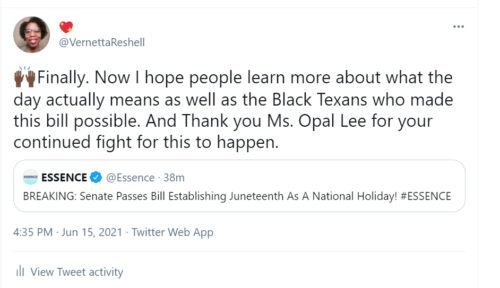

This month I wanted to explore Juneteenth through the eyes of Black Texas natives as we celebrate something that has gone national. In this series, Creative Expressions Celebrating Juneteenth I’m taking creative works to share the depth and significance of what this day means while helping you learn something new each week.
My mom gifted me ‘On Juneteenth’ which is part memoir, part Black Texas history by Harvard University Professor Annette Gordon-Reed. And just like the creative works I’m showcasing this month, she is a Texas native.
Before we get into the book, I learned some incredible history from my mom’s friend that actually ties quite nicely with ‘On Juneteenth’. I asked my mom’s friend Mrs. Cynthia what Juneteenth meant to her as a Texas native. This is what she shared with me.
It means freedom for a race of people who were enslaved until 1865. In Texas it was June 19, 1865, over two years after the Emancipation Proclamation was signed into law. In Tyler, Texas at Camp Ford, during the 1863-1865 time period, Union soldier prisoners were telling the enslaved people working around the camp that they were officially freed before 1865, but Texas did not honor that law. It took the official reading in Galveston, Texas on Juneteenth 1865 to make it final. The Texas holiday seems to be the only one I hear about that commemorates such an important day.
Cynthia L.
Camp Ford was the largest confederate prison west of the Mississippi River during the Civil War. It operated from spring 1862 to May 22, 1865.
The fact that Union soldiers were captured in the area I grew up in and were telling enslaved Black Texans they were free is a piece of history I never ever heard before. And I’m so glad I’m able to share that with you. So there were people around Texas who were probably spreading that but the “powers” that be in Texas just wasn’t about to let that happen. They still wanted to get another harvest or two in.
This brings me back to the book, ‘On Juneteenth’. The majority of the book is talking about stories of her childhood and Black history from Conroe, TX where Annette Gordon-Reed, the author, grew up. These stories and the history of Texas plays a role as she shares about Juneteenth.
At first, I was like what does this have to do with anything. Here I am acting like people I’m calling out online about their misunderstanding of the significance of Juneteenth. But that history laid the foundation for why Juneteenth means so much to us and our families. Why Juneteenth is a day to celebrate with family, loved ones and reminisce on what hearing about freedom throughout the decades.
Origin stories matter, for individuals, groups of people, and for nations. They inform our sense of self, telling us what kind of people we believe we are, what kind of nation we believe we live in. They usually carry, at least, a hope that where we started might hold the key to where we are in the present.
Annette Gordon-Reed, an except from On Juneteenth’
This is why the origins of Juneteenth are important. Because there are absurd retellings of history. Without the voices of Black Texans who can pass down and/or along oral history one day we may not be able to reminisce on Juneteenth. It could eventually become whitewashed and commercialized beyond recognition.
I made a comment on a YouTube video stating that a Juneteenth celebration by a Black news media not taking place in Houston, Dallas or Galveston was disappointing. This is what I was subjected too by someone who obviously has no clue about the origins of Juneteenth. The ties it has to Texas. Or how Juneteenth has shaped so many Black Texan lives.
This is why the above statements are ignorant and dangerous to Black History. Sorry but Dr. King did not make Juneteenth. But countless Black Texans that the broader Black American community won’t google did.
And these Black Texans have a distinct history unlike other states. Which is why Juneteenth is so dear to many Black Texans.
Texas was founded on the violent principles of owning people. In the U.S. constitution they said “all men created equal”. But in the Texas Constitution when it was its own country for a decade this is what they stated about people of African descent.
SEC. 9 All persons of color who were slaves for life previous to their emigration to Texas, and who are now held in bondage, shall remain in the like state of servitude: provided, The said slave shall be the bonafide property of the person so holding said slave as aforesaid. Congress shall pass no laws to prohibit emigrants from brining their slaves into the republic with them, and holding them by the same tenure by which such slaves were held in the United States; nor shall congress have power to emancipate slaves; not shall any slaveholder be allowed to emancipate his or her slave or slaves without the consent of congress, unless he or she shall send his or her slave or slaves without the limits of the republic. No free person of African descent, either in whole or in part, shall be permitted to reside permanently in the republic without the consent of congress; and the importation or admission of Africans or negroes into the republic, excepting from the United States of America, is forever prohibited and declared to be piracy.
The Constitution of the State of Texas
So the misconception that Juneteenth is innately a Black American tradition is far from the truth. Without Black Texans migrating to other places and taking their history with them, it more than likely would have stayed in Texas and/or surrounding states for much longer. Again, without knowing the origins of Juneteenth would place rhetoric that this celebration is a blanket statement for all erases the fight that many Black Texans fought for decades to get this holiday recognized.
On the basis of origin, while many people are stuck on the 1619 Project, there are written and oral records that people of African descent were in Texas hundreds of years before Anglo-Americans. Let’s learn a little bit of African Texas history for a second.
Little is known about the African that was in Texas in the 1520s with Spanish Explorers who had a gift for speaking other languages. Which helped when they needed to communicate with the Indigenous tribes across the Southwest. As they trekked from Texas (landing in Galveston) to the Pacific Ocean before finally meeting up with Spaniards again after being enslaved themselves for about 7 years, Estaban translated for them. Estaban is the first known recorded African in Texas who is of Berber origin from present-day Morocco. He was a Muslim who was forced to convert to Christianity when he was captured and enslaved by the Portuguese at an early age but purchased by Andres Dorantes in his 20s. The work Estaban did with the Spanish laid a strong foundation for what Texas would later become.
There were other accounts that Africans were in Texas over a hundred years after Estaban died. It wasn’t until 1691 that there were other possible Africans who lived near the Rio Grande seen. They may have been shipwrecked and then lived with the Indigenous tribes of the land. Either way, Africans were in Texas long before Anglo-Americans came and before the Spanish really took control of the land as part of Mexico. Which didn’t happen until 1689. So for the Black Texans born and raised in south Texas who say they have “Indian in their blood”. They very well could since the Africans mixed and married with the Indigenous tribes beginning in the late 1600s.
Now if that’s not an origin story, I don’t know what is. This origin story helped to make the zeal, fortitude and determination of Black Texans a possibility.
Let’s fast forward to June 19, 1865. General Granger came upon the shores of Galveston Island from Louisiana where 75% of his soldiers were Black just a few days prior to restore order to Texas. After getting there, he wrote General Order No. 3 to enforce the Emancipation Proclamation. June 19, 1865 he would legally read the order that freed an estimated 250,000 enslaved Black Texans.
“The people of Texas are informed that in accordance with a Proclamation from the Executive of the United States, all slaves are free. This involves an absolute equality of rights and rights of property between former masters and slaves, and the connection heretofore existing between them becomes that between employer and hired laborer. The freedmen are advised to remain quietly at their present homes and work for wages. They are informed that they will not be allowed to collect at military posts and that they will not be supported in idleness either there or elsewhere.”
On June 19, 1865, General Granger read General Order Number 3.
Before Black Texans could celebrate, white mobs began violently attacking them, threatening them and squashing what should have been a day of rejoicing. Instead it silenced many Black people around the state.
If the promise of Juneteenth lived anywhere in Texas, it was in Galveston. That sense of promise spread across the state. Black Texans were determined, despite the early intimidating anger or whites to celebrate what was initially called Emancipation Day.
Excerpt from, ‘On Juneteenth’
Despite attacks and threats, Black Texans began to organize through their churches to celebrate the day, purchased land that later became parks so they could celebrate Juneteenth, bought land to build their own communities and began living their American promise. The passing down of the stories allows us a chance of reminiscing on Juneteenth each year to keep our legacy alive.

If you want to hear from the author of ‘On Juneteenth’ and why she decided to write this book, here’s a conversation she had at Thomas Jefferson’s Monticello on June 15, 2021.


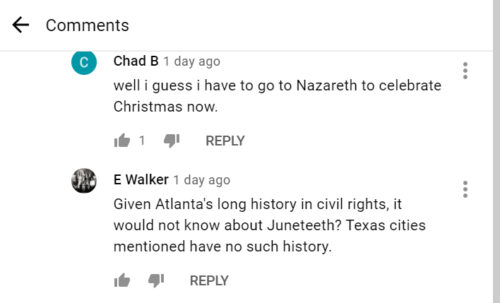
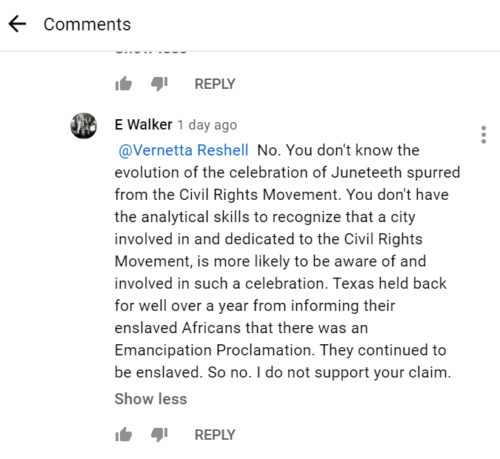
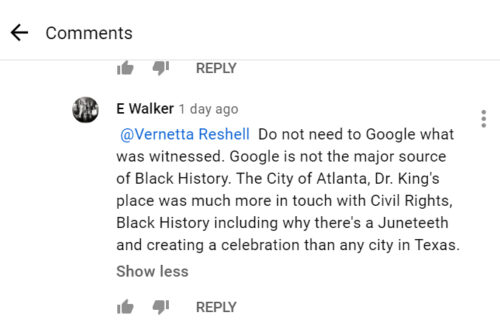
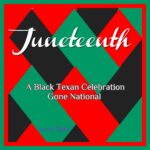



Leave a Reply